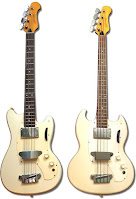 |
| Orville Redenbacher |
When I think of the name Orville the first thing that comes to mind is the popcorn guy that graced our TV screens back in the 1980’s, hawking his popcorn as being superior to all the rest.
Then in 2015 there was a television series that was produced and starred Seth MacFarlane, of Family Guy fame. It was called The Orville and was a science-fiction comedy drama in the genre of Star Trek.
But for all you guitar connoisseurs I am sure you are thinking about Orville Gibson. Mr. Gibson was a luthier that lived and worked in the Kalamazoo, Michigan area.
He developed an unusual concept for creating mandolins and guitars that involved the use of violin carving techniques to carve the instruments back and top into shape rather than pressing or bending the wood. The instruments sides were also carved instead of being bent. Mr. Gibson was able to patent this process around 1898.
 |
| 1902 The Start of The Gibson Guitar Company |
Apparently Orville, at the time, had some ideas that his investors considered to be too eccentric.
In 1908 Gibson drew a salary of approximately $500 a year from the company, which is the equivalent to around $20,000 in today's dollars.
Orville Gibson was not a healthy man. He was hospitalized for endocarditis in 1907, 1911, and 1916. He passed away in 1918 at the age of 62 while he was living in the state of New York. His designs were eventually replaced by those of Lloyd Loar. Of course the Gibson Guitar company went on to become one of the most successful and well known guitar manufacturers in the United States.
 |
| Teisco Guitars 1965 |
Though both Gibson and Fender threatened lawsuits, it was in 1977 that Gibson actually filed suit. The case was known as Gibson V Elger Music.
 |
| Former site of Medley Music |
And they were very nice guitars. However this venture proved to be too costly. Within a year he had to let the luthiers go.
 |
| Elger Guitar |
Eventually Hoshino Gakki purchased the Elger brand and Medley Music with the intent of using the store as their US based distribution center.
After the purchase Hoshino began importing their electric as well as acoustic instruments through Medly (Elger) Music. Those electric guitars and basses, though not the quality of their US counterparts, certainly looked like Gibson and Fender instruments.
In 1977 attorneys for Gibson sent Elger Music, owned by Hoshino Gakki, a notice of a lawsuit in federal court for copyright infringement. The suit was eventually settled out of court. Guitars produced during this period are known as Lawsuit Guitars, although only not all were actual lawsuit guitars.
Afterward, though some of the bodies retained a similar shape, to appease Gibson the open book headstock was not allowed to be used on the Asian made guitars.
If you were like me, growing up in the 1960’s, you will remember all of the cigarette commercials that flooded television much like the overpriced medicine commercials we see today. In those days there was a cigarette called "Tareyton" whose commercials featured smokers with black eyes that declared, “I’d rather fight than switch”.
 |
| 1971 Japanese Made Epiphone |
Since then we have Epiphone and Squier guitars. Both companies also realized there was quite a large, untapped market in Japan for their instruments. Which brings us to The Orville Guitar.
Orville by Gibson also known simply as Orville, was a brand of guitars that was managed by the Gibson Guitar Corporation to be licensed solely for the Japanese market during the late 1980s and most of the 1990s.
 |
| Yamano Gakki Shop |
In 1987 Yamano Gakki obtained the Gibson and Epiphone dealership solely for the Japanese market. This company also distributed Gibson and Korean made Epiphone guitars, and also produced a limited range of Epiphone semi-acoustic guitars in Japan in cooperation with Gibson.
 |
| Pages From The 1988 Orville Catalog |
At the time Gibson was also selling American-made Gibson guitars, Japanese-made Epiphone guitars, and Korean-made Epiphone guitars in Japan and wanted Orville to stand out as a separate brand.
The Orville by Gibson series distributed by Yamano Gakki at a price point midway between the American-made Gibson guitars and the Korean-made Epiphone guitars. The Orville guitars were superior instruments and in every way and comparable to American made Gibsons, and as stated selling at a lower price than American made Gibson's, and above Japanese or Korean made Epiphones.
Production of Orville Guitars ceased in 1998 due to Gibson and Yamano Gakki deciding to export an expanded Epiphone Japan model range that included solid body, semi acoustic models, and even acoustic guitars. By late 2006 Gibson and Yamano Gakki ended their relationship.
 |
| Terada Guitar Factory (L) Fuji-Gen Factory (R) |
Eventually some Orville by Gibson guitars found their way into the United States. They are considered to be excellent instruments.
Click on the links below the pictures for sources. Click on the links in the text for further reading.
©UniqueGuitar Publications 2021 (text only)
This is a long video, but very informative.







































